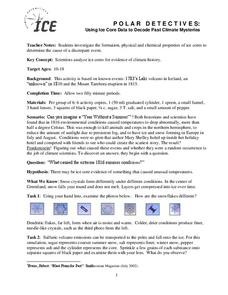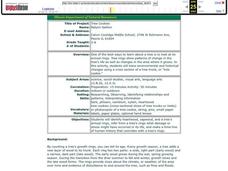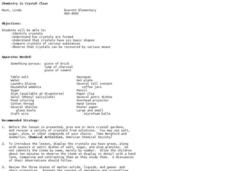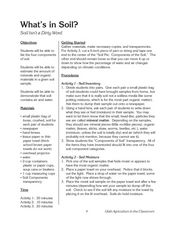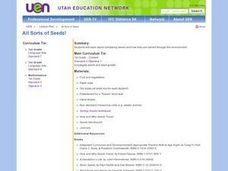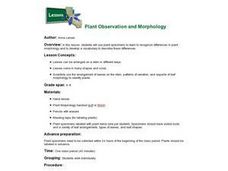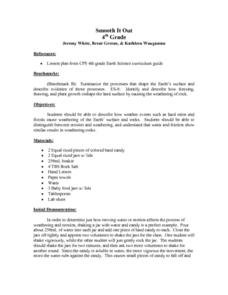Curated OER
Aquatic Science
What a terrific way to explore the pond habitat! Learners discuss the animal and plant life found in the Long Island area. They also discuss vocabulary terms, identify pollution concerns, and resource conservation.
Curated OER
Mealworms
Crawl into the world of the darkling beetle with this scientific investigation. Watch as the insects move through the larval, pupal, and adult stages of life, recording observations along the way. Discuss the necessities of life as young...
Scholastic
Minibeasts
Lead young scientists to discover insects outdoors. After investigating, students will record observations, learn about these fascinating creatures, craft, and role play.
Polar Trec
Polar Detectives: Using Ice Core Data to Decode Past Climate Mysteries
How does examining an ice core tell us about weather? Learners set up and explore fake ice cores made of sugar, salt, and ash to represent historical snowfall and volcanic eruptions. From their setups, scholars determine what caused the...
Curated OER
F.B.I.
Students create a worm bin full of fruit and vegetable scraps wit paper and observe what happens over time. In this decomposers lesson plan, students observe that the fruit and vegetable scraps become new soil.
Curated OER
Edible and Medicinal Plants: Field Trip Guide
Though it's designed to guide a field trip to the New York Botanical Garden, you could take resource like this one to a local park, wilderness area, school garden, or even a weedy empty lot. Middle schoolers identify plant parts and...
Curated OER
Tree Cookies
Students identify heartwood, sapwood, and a tree's annual rings, infer from a tree's rings what damage or stress might have occurred in its life, and make a time-line of human history that coincides with a tree's rings.
Curated OER
Prairie Find Outdoors
Young scholars take a field trip to a local prairie. Using identification books, they identify various forbs and grasses in the prairie. As a class, they discuss the importance of forbs and grasses to the ecosystem and review the various...
Curated OER
Invasives and Macroinvertebrates
High schoolers view macroinvertebrates, or discuss previous collection activity. They graph data on macroinvertebrates in the Hudson River. Students discuss the relationship between habitat, environmental changes, and invertebrate...
Curated OER
Let's Get Carried Away
Students discover how seeds travel from their parent plants in search of water, sunlight, and nutrients, and conduct experiments in which they note characteristics that encourage seed dispersal by means of wind, water, animal carriers,...
Curated OER
What is Sand?
Students complete a sand analysis project. In this sand grains lesson, students learn background information on how sand is formed and what sand grains are made of. Students are given bags of sand and use them to complete a worksheet...
Curated OER
Teaching Kids about the Environment
Fifth graders identify the species of plants and animals found in an environment. They compare these findings to plant and animal species found in an unlike environment. Students acquire and compare soil samples from the two sites chosen.
Curated OER
What Is in a Rock?
Young scholars identify, sort, and classify mineral samples that make up a common rock.
Curated OER
Dissolved Oxygen in an Aquatic Ecosystem
Students explain why dissolved oxygen is important in aquatic ecosystems. They evaluate the optimal dissolved oxygen levels for living organisms.
Curated OER
Seed Sorting
Young scholars examine and sort seeds. In this life science lesson, students make general observations of a tub of seeds, then develop sorting criteria for sorting the deeds. Lesson includes extension activities.
Curated OER
Chemistry is Crystal Clear
Students observe crystals and their shapes and formation. In this crystal formation lesson plan, the teacher prepares crystal gardens for the students to observe, then the class finds examples of crystals in nature and observe a teacher...
Curated OER
Do You Know Bamboo?
Students understand the properties of Bamboo and what it can be used for. In this bamboo lesson, students with bamboo and compare and contrast to wood. Students share their findings.
Curated OER
What's in Soil?
Students examine soil samples and make observations. In this soil lesson plan, students participate in experiments to determine the components (mineral matter, organic matter, water air) in the soil. Students analyze a pie graph on the...
Curated OER
Invertebrate Diversity
Students observe different animals with bilateral symmetry. In this biology lesson, students compare how these animals move. They discuss the evolutionary history of observed animals.
Curated OER
Sight
Students discover how the sense of sight helps us recognize each other and explore color, motion and distance.
Curated OER
All Sorts of Seeds!
First graders compare seeds and explore how they are carried through the environment.
Curated OER
Plant Observation and Morphology
Students use plant specimens to explore how to recognize differences in plant morphology and to develop a vocabulary to describe these differences. They brainstorm: What is a plant? What parts do plants have? What is a leaf? Students...
Curated OER
Smooth It Out
Fourth graders describe how weather events such as hard rains and floods cause weathering of the Earth's surface and rocks. They distinguish between erosion and weathering, and comprehend that water and friction show similar results in...
Curated OER
Living and Nonliving
Students use their senses to record and collect data. In How Do I Classify Things in My World?, students practice classifying objects as living or nonliving. In Is it Real Or Pretend?, students group objects as real or pretend. In What...





